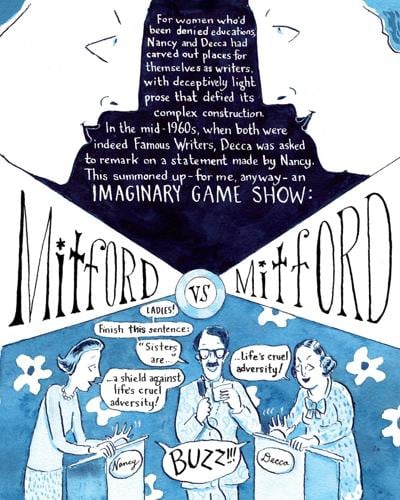In the early 20th century, six eccentric sisters grew up in splendid isolation in the English countryside, aristocratic and slightly feral children of Baron and Lady Redesdale, David and Sydney Freeman-Mitford, known familiarly as Muv and Farve.
The girls raised chickens, rode horses, kept rats and sheep as pets, read whatever they could find in their family library, devoured news in print and on radio, argued about politics with one another over meals, created secret languages, told stories and boldly defied convention.
Cartoonist and screenwriter Mimi Pond’s glorious new graphic biography, “Do Admit! The Mitford Sisters and Me,” will delight, instruct and enrage readers both familiar with and new to the lives of autodidacts Nancy, Pamela, Diana, Unity, Jessica and Deborah, wild women both decidedly of their time and chillingly of our own. It is entrancing, witty and visually inventive, as singular as the sisters themselves.

The author of numerous books, Mimi Pond has also written for “The Simpsons” and “Pee-wee’s Playhouse.”
Mimi Pond/Drawn & QuarterlyNeatly interweaving her own bookish childhood and adolescence in 1950s and ‘60s Southern California, Pond compares and contrasts her coming of age with theirs, noting that, like Jessica, she dreamed of escaping her prosaic life (though she did not have a “running away account” for that very purpose invested at the bank).
Referencing extant biographies, troves of letters and books by the Mitfords (all of the sisters except Unity published in their lifetimes and many of their books were bestsellers that sold hundreds of thousands of copies), and six years in the making, Pond’s Prussian blue ink drawings not only adeptly follow the remarkable threads of each Mitford girl’s life but also suggest new ways of seeing them.
Her enthusiasm for their extraordinary lives equals her empathy for the losses and tragedies each endured while clearly describing the trajectories of these idiosyncratic six: Nancy the writer, Pamela the farmer, Diana the fascist, Unity the antisemite, Jessica the muckraker and civil rights advocate, and Deborah the duchess.

Mitford sister Diana was married to British Fascist Oswald Mosley.
Mimi Pond/Drawn & QuarterlyFor contemporary readers, the then-accepted and cruel attitudes to the risks of childbirth, as well as the ease with which the British aristocracy quietly endorsed bigotry and considered fascism a legitimate solution, will be infuriating.
There was a family shorthand of nicknames lavished by the girls in person and in writing throughout their lives, including Naunce, Woman, Honks, Bobo, Boud and Hen — names that their peculiar parents also used unabashedly. Teasing was a beloved family sport, an impetus that sometimes led to rifts between a pair or three, who, for a time that might last weeks or years, were no longer “on speakers” with one another.
All of them were presented at court, enduring rounds of balls with fellow aristocrats in their debutante seasons, most of the young eligible men considered “chinless horrors,” with nothing of real value to add other than perhaps money or family title — undesirable for many of them, especially when accustomed to the “bright young things” eldest sister Nancy had in her social orbit.

Sister Deborah had to endure “chinless horrors” at debutante balls.Â
Mimi Pond/Drawn & QuarterlyThe Mitfords were impervious to shame, possibly due to Farve’s ongoing lack of business acumen and knack for investing in ridiculous schemes. They were all as at ease in a cramped, damp London flat above a garage as they were in one of their country piles like Batsford Park, Asthall Manor or Swinbrook House.
Being related to both “Cousin Winston” (Winston Churchill) and “Jack” (John F. Kennedy) through marriages provides intriguing sidebars that offer front-row seats to entertaining behind-the-scenes moments in history.
Earlier this year, the Daily Mail produced a podcast called “Hitler’s English Girlfriend: The Secret Diary of Unity Mitford” after the news organization announced that it had obtained from an anonymous source her diary from 1935-39, an inflammatory and fascinating document chronicling the 139 times she met with Hitler, ending on Sept. 1, when Germany invaded Poland, igniting the Second World War.
In June, the streaming channel BritBox launched Season 1 of “Outrageous,” a limited series about the family from Nancy Mitford’s point of view. Based on biographer Mary S. Lovell’s “The Mitford Girls” and adapted by Sarah Williams, it spans from 1931, when Diana is married to Bryan Guinness and the mother of two young boys and then becomes “the most hated woman in England” when she weds Sir Oswald Mosley (leader of the British Union of Fascists), through 1937, when Jessica runs away to the Spanish Civil War with fellow Communist and future husband Esmond Romilly, while Unity is in Munich cosying up to Nazis and stalking Hitler at the Osteria Bavaria.

Jessica Mitford, a.k.a. Decca, rebelled against the far-right politics of her parents.
Mimi Pond/Drawn & QuarterlyAnd this month, “The Party Girls,” British playwright Amy Rosenthal’s new work about the illustrious six sisters through the eyes of Jessica, premiered at the Marlowe Theatre in Kent before embarking on a national tour.
Do admit: we’re in the midst of a Mitford renaissance, and Pond’s book is essential reading about those outrageous, intelligent, defiant women who were irrepressibly, unapologetically themselves.
Mimi Pond will sign books at a Drawn & Quarterly event on Sept. 16, at 5 p.m., at the Lillian H. Smith branch of the É«É«À² Public Library, 239 College St.




































To join the conversation set a first and last name in your user profile.
Sign in or register for free to join the Conversation